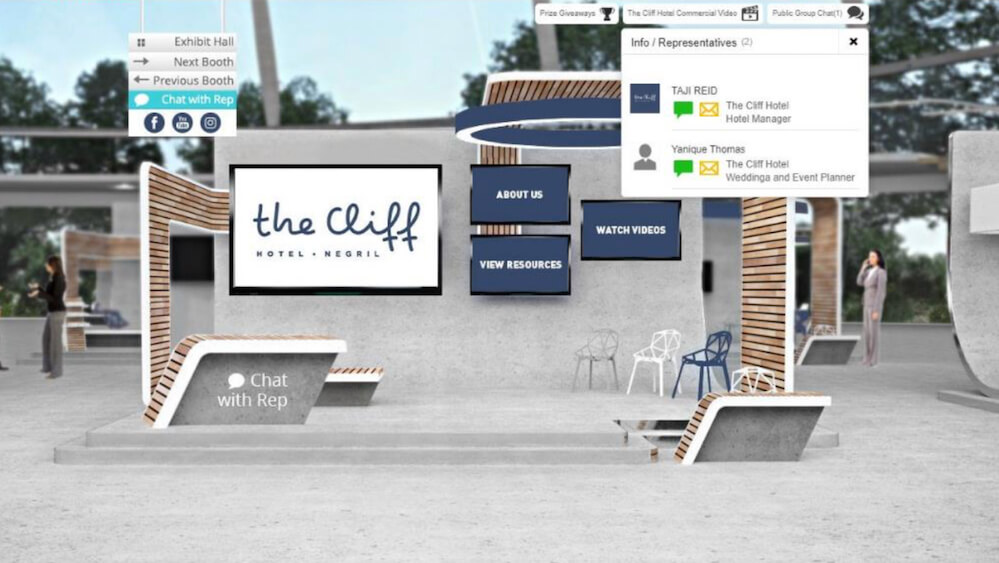
At ASTRO’s annual meeting, attendees will be able to immerse themselves in the virtual exhibit hall experience by entering booths similar to this example, shown during ASTRO’s recent webinar walkthrough for exhibitors.
American Society for Radiation Oncology’s (ASTRO) Annual Meeting brings together approximately 12,000 professionals in the radiation oncology community, including physicians, nurses, biologists, physicists, and radiation therapists who collectively treat more than one million cancer patients every year. The 2020 event was set to bring oncology professionals from around the globe to the Miami Beach Convention Center in October, but on May 5, ASTRO President Thomas J. Eichler, MD, FASTRO, announced that out of an “overwhelming concern for the safety and well-being of our members, their patients, exhibitors, staff, and the families of all involved” during the pandemic, the association’s board of directors “made the important decision to transition the live meeting in Miami to an immersive and interactive virtual meeting that will occur over the same dates.”
Given that ASTRO’s members treat cancer patients — who are at a higher risk of contracting and dying from COVID-19 — it was critical to find a new way to deliver content in 2020, the association’s CEO, Laura Thevenot, told Convene. “Most of our members are on travel restrictions, [some] through June of next year,” she said, so a face-to-face conference may not be a possibility for many of the event’s attendees.
Thevenot said the choice to go digital has been embraced by not only ASTRO’s board of directors, but by event exhibitors and attendees as well, partly because the organization has given its staff enough lead time to create “the best possible virtual meeting.”
Transformation Times Two
The organization was already in the second year of a three-year reinvention program, with an emphasis on debate, discussion, and interactivity at its in-person event. “Medical meetings have been pretty stagnant in the way we present content — didactic lectures and not very much interactivity,” Thevenot told Convene in April, before the decision was made to change the format to virtual. “We really stepped back and thought about how people get information now. … People are listening to podcasts and looking on mobile apps. We really wanted our meeting to reflect that change of how people are getting and processing their information.”
In 2019, ASTRO introduced more TED Talk–style presentations, entirely virtual posters, and presentations on cancer breakthroughs in fields beyond radiation oncology. Though some plans for year two of the program’s reinvention will need to be placed on hold until ASTRO’s next in-person annual meeting in 2021, “we are not doing a skinnied-down meeting,” Thevenot said, adding that ASTRO’s plan is to incorporate all of the typical meeting content, including concurrent sessions, plenaries, and clinical trials. That’s 120 education, workshop, masterclass, and panel sessions, and 2,500 abstract presentations, to be exact. “We are not going to make this into the ASTRO virtual meeting,” she said. “It’s going to be the ASTRO Annual Meeting.”
Miami Beach, Through a Screen
On June 1, ASTRO produced three hour-long webinar presentations for exhibitors to demonstrate how they, as well as attendees and sponsors, will be able to take part in the immersive event. Much like the newly transformed face-to-face meeting, ASTRO’s virtual meeting will emphasize engagement, whether attendees are in educational sessions, visiting exhibitor booths, or “walking” around the virtual convention center. (Thevenot could not disclose the platform vendor at the time she spoke with Convene.)
The attendee experience will begin outside of a virtual version of the Miami Beach Convention Center, where they will be greeted by Eichler — or his avatar, which all ASTRO staff members will have during the meeting — and provided instructions on how to navigate the space. From there, attendees can click through to different areas of the convention center, which will be outfitted with the same sponsored messaging placement — floor decals, escalator clings, etc. — as at real-life event venues. Those items will be “live” and can be clicked on to redirect attendees to a sponsor’s website or exhibitor booth. Attendees will be able to navigate to different rooms to watch pre-recorded content, semi-live content that features pre-recorded talks with live Q&A chats with the speaker, and live presentations, which can all be searched for by topic or speaker. Attendees can also check out virtual posters, for which presenters have the option to record narration, or drop into a breakout area if they see a topic that they’re interested in.
Once attendees enter the exhibit hall, they will be able to use navigation tools to move around the space and search for an exhibitor by name or description. In the booths, exhibitors can display white papers, videos, and PDFs, as well as engage in group chats with attendees. Much like at its face-to-face event, ASTRO is offering different tiers of exhibit booths, with higher-tiered options providing more spaces to display content and a video chat function. Exhibitors will be able to customize the look of their space, as well as how attendees are able to “move” through the space by clicking around.
It’s these kinds of innovations, Eichler said in one of the webinars, that he hopes will not only create a special user experience this year, “but maybe even change the way meetings are done in the future.”
Casey Gale is an associate editor at Convene.
